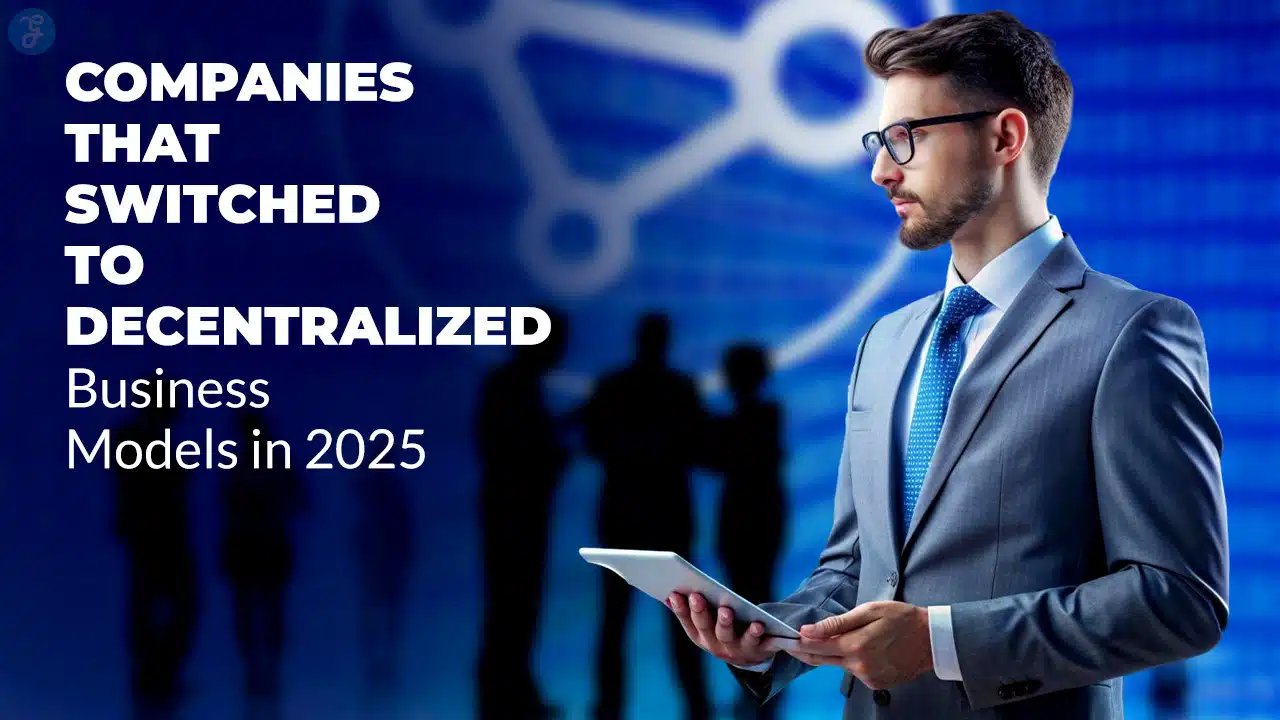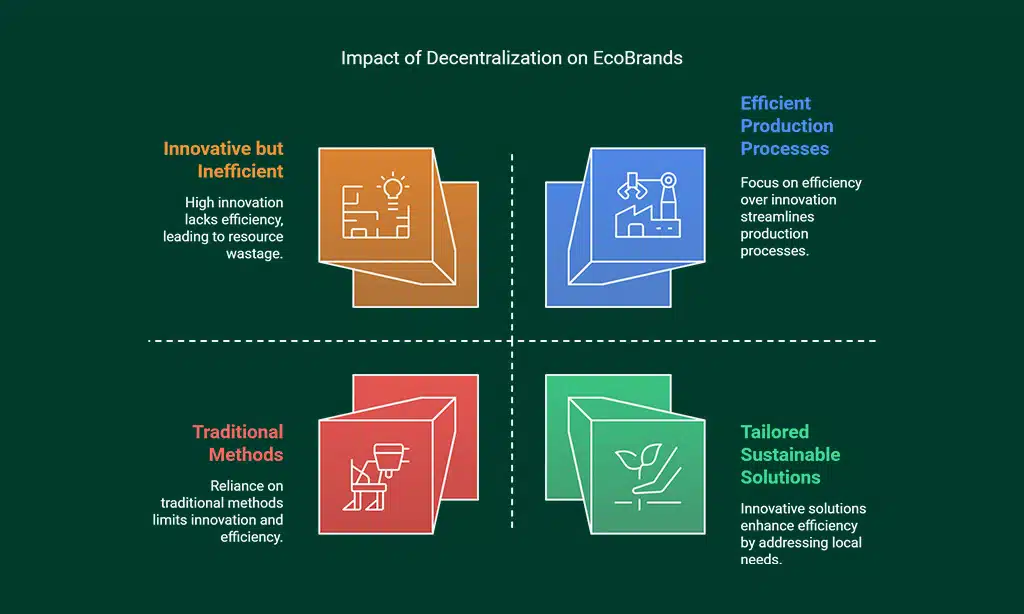In the rapidly evolving world of business, companies are constantly seeking ways to adapt to new technologies, customer demands, and market dynamics. One major shift in recent years has been the adoption of decentralized business models.
These models focus on distributing power and decision-making across different parts of an organization, empowering teams, and streamlining processes. As we move into 2026, decentralization has become not only a trend but a necessity for many companies seeking to stay competitive in a fast-paced, technology-driven environment.
This article will explore 10 prominent companies that switched to decentralized business models in 2026, highlighting the reasons behind the shift, the benefits of such a transition, and the impact on their operations.
Along the way, we will discuss the strategic advantages, challenges, and lessons learned from companies that have embraced decentralization.
What is a Decentralized Business Model?
A decentralized business model refers to a structure where decision-making, authority, and responsibilities are distributed across various levels of an organization, rather than being concentrated at the top. This type of model contrasts with traditional hierarchical business structures, where decisions are made by a few central leaders.
In a decentralized model, departments or teams have the autonomy to make decisions, which helps them be more agile and responsive to changing business needs. The primary focus is on empowering employees, fostering innovation, and enabling a more flexible and adaptive work environment. This shift has been made possible due to advancements in technology, particularly in communication tools, cloud-based platforms, and data management systems.
Key Characteristics of Decentralized Business Models
- Distributed Decision-Making: Authority is spread across various levels, allowing for faster decisions.
- Increased Autonomy: Teams have the flexibility to make decisions without waiting for approval from the top.
- Collaborative Culture: Employees from different departments work closely together to achieve common goals.
- Scalability: The structure allows businesses to scale faster by empowering local teams to act independently.
In 2026, decentralization is being driven by the need for businesses to be more adaptable, innovative, and responsive to the challenges of a globalized economy. The rise of remote work, blockchain technology, and digital collaboration platforms has also played a significant role in enabling decentralization.
Why Are Companies Shifting to Decentralized Models?
There are several reasons why companies are increasingly adopting decentralized business models. Let’s take a closer look at the primary drivers behind this shift.
The Rise of Digital Technologies and Their Role in Decentralization
The digital revolution has radically changed how businesses operate. Technologies such as cloud computing, AI, machine learning, and blockchain enable businesses to function more efficiently without requiring a centralized authority. Teams can now collaborate in real time, regardless of their geographic location, and access data in a decentralized manner.
Cloud computing has made it easier for organizations to share data, manage workflows, and communicate without relying on centralized servers or systems. Similarly, blockchain technology offers decentralized record-keeping, providing transparency and security while eliminating the need for a central authority to manage transactions.
Market Demands for Transparency and Flexibility
Consumers are increasingly demanding transparency, accountability, and flexibility from the companies they engage with. Decentralization allows businesses to respond more quickly to market changes, customer feedback, and evolving industry standards. By empowering teams and giving them the autonomy to make decisions, businesses can better meet customer needs and stay ahead of competitors.
Risk Mitigation and Resilience Through Decentralization
Decentralization allows companies to spread out risks and avoid the vulnerabilities that come with a centralized model. By diversifying decision-making across different levels, businesses are better equipped to handle disruptions, whether from economic shifts, technological failures, or external crises.
For example, if a central hub of operations is compromised, decentralized companies are less likely to experience a significant impact because their teams can continue operating independently. In 2026, with the increasing frequency of global disruptions, risk management through decentralization is becoming a top priority for many companies.
Competitive Advantage in 2026’s Business Landscape
As markets become more competitive, companies must find ways to differentiate themselves and operate more efficiently. Decentralized business models give companies the flexibility to innovate faster, test new ideas, and scale more effectively. This agility provides a competitive edge in an environment where speed and adaptability are critical to success.
Key Challenges in Transitioning to Decentralized Business Models
While decentralization offers numerous benefits, the transition is not without its challenges. Companies must carefully consider various factors when adopting a decentralized model, as the process can be complex and resource-intensive.
Resistance to Change Within Organizations
One of the most significant obstacles to decentralization is the resistance to change from employees and leadership. Many individuals are accustomed to centralized decision-making and may be hesitant to give up control. Overcoming this resistance requires strong leadership, clear communication, and a well-structured change management process.
Technological Hurdles
The shift to a decentralized business model often requires significant investment in new technologies. Companies need to implement tools that enable seamless communication, collaboration, and data sharing across teams. Additionally, security and data privacy concerns must be addressed, particularly when decentralizing sensitive information or transactions.
Managing Communication Across Distributed Teams
Decentralized companies often have teams spread across multiple locations, making communication and collaboration more challenging. Without effective communication channels and processes, misunderstandings and delays can occur. Implementing the right tools and fostering a culture of open communication are critical to ensuring smooth operations in a decentralized environment.
Ensuring Security and Data Privacy
With decentralization comes an increased risk of data breaches and security threats. Companies need to invest in robust security measures, such as encryption, secure cloud storage, and multi-factor authentication, to protect their data and maintain customer trust. Blockchain technology is one tool that many decentralized businesses are using to enhance security and transparency.
10 Companies That Switched to Decentralized Business Models in 2026
In 2026, many prominent companies have made the transition to decentralized business models to capitalize on the benefits of increased flexibility, speed, and innovation. Let’s take a closer look at 10 companies that have successfully made this switch.
1. Company A: Tech Solutions Inc.
Tech Solutions Inc., a global software development company, transitioned to a decentralized model in 2026 to streamline its operations and accelerate product development. By decentralizing decision-making, Tech Solutions empowered its development teams to take ownership of projects, leading to faster release cycles and more innovative products.
Impact of Decentralization:
- Reduced product development timelines by 30%
- Increased innovation and product quality
- Improved employee satisfaction and collaboration
2. Company B: Global FinTech Corp.
Global FinTech Corp., a leader in financial technology, adopted a decentralized business model to improve customer service and responsiveness. With teams operating independently, they were able to respond to customer queries and implement changes in real time, which enhanced their competitive position in the market.
Impact of Decentralization:
- 40% improvement in customer satisfaction ratings
- Increased revenue from new product offerings
- Enhanced team autonomy and decision-making
3. Company C: GreenEnergy Solutions
GreenEnergy Solutions, a renewable energy company, adopted a decentralized approach to optimize its supply chain management. By giving local teams more control over inventory and supplier relationships, GreenEnergy was able to reduce costs and improve delivery times.
Impact of Decentralization:
- 20% reduction in supply chain costs
- Faster time-to-market for new energy solutions
- Improved sustainability practices across global teams
4. Company D: HealthTech Innovations
HealthTech Innovations, a healthcare technology company, decentralized its operations to improve patient data management and healthcare delivery. Teams responsible for data security and patient care were given the autonomy to implement solutions tailored to their regions, leading to more efficient care.
Impact of Decentralization:
- Enhanced data security and privacy
- Increased regional adaptation to healthcare needs
- Reduction in bureaucratic delays
5. Company E: Global Retail Group
Global Retail Group, a multinational retail company, embraced decentralization to improve its customer experience. By allowing regional teams to make decisions based on local market conditions, Global Retail was able to offer personalized services and products.
Impact of Decentralization:
- 15% increase in customer retention
- Improved localized product offerings
- Faster response times to market changes
6. Company F: SmartLogistics Group
SmartLogistics Group, a leader in logistics and supply chain solutions, adopted a decentralized model in 2026 to improve its global operations. By giving local managers more autonomy over their specific regions and networks, SmartLogistics enhanced its ability to respond quickly to supply chain disruptions and customer demands.
Impact of Decentralization:
- 25% improvement in on-time delivery rates
- Greater adaptability in responding to regional supply chain disruptions
- Reduced operational costs due to improved coordination and decision-making
7. Company G: EcoBrands
EcoBrands, a sustainable product manufacturer, shifted to a decentralized business model to improve responsiveness and innovation across its production facilities. By decentralizing decision-making, the company empowered local teams to adapt to regional sustainability challenges and create tailored solutions for customers.
Impact of Decentralization:
- Boosted innovation in sustainable product designs
- Increased operational efficiency and reduced waste by 18%
- Stronger connections with local communities and markets, leading to improved sales
8. Company H: CloudCom Solutions
CloudCom Solutions, a cloud services provider, implemented decentralization to enhance its ability to scale and meet customer demands across different geographies. By empowering local teams to handle operations and customer service independently, CloudCom improved response times and customer satisfaction.
Impact of Decentralization:
- Increased customer satisfaction by 35%
- Faster deployment of cloud services in new regions
- Enhanced security and compliance with local regulations
9. Company I: Digital Media Enterprises
Digital Media Enterprises, a content creation and distribution company, transitioned to decentralization to speed up its content production and better engage with regional audiences. By decentralizing its teams, Digital Media allowed for faster creation and localization of content for different markets.
Impact of Decentralization:
- 40% reduction in time required for content production
- Better regional content adaptation, increasing audience engagement
- More diverse content offerings tailored to local tastes and preferences
10. Company J: FutureAutomotive Tech
FutureAutomotive Tech, an electric vehicle (EV) manufacturer, adopted a decentralized approach to accelerate innovation in EV design and manufacturing. By decentralizing its R&D and production teams, Future Automotive Tech improved its ability to test new ideas quickly and scale successful innovations.
Impact of Decentralization:
- Shortened product development cycle by 30%
- Enhanced innovation in EV technology, leading to the launch of two new vehicle models
- Improved collaboration across different engineering and design teams
The Future of Decentralized Business Models
The shift towards decentralized business models is not just a passing trend; it is reshaping the way companies approach everything from decision-making to innovation and customer engagement. As we move further into 2026 and beyond, decentralization will play a crucial role in enabling organizations to stay competitive and agile. Here are some key trends and predictions for how decentralization will continue to evolve:
Industry-Specific Impact of Decentralization
- Finance: With the rapid rise of decentralized finance (DeFi), traditional financial institutions are being challenged by decentralized models that allow for peer-to-peer transactions without relying on central authorities. Blockchain and cryptocurrency platforms are driving this change, creating new opportunities for businesses and consumers to access financial services.
- healthcare: Decentralization in healthcare will bring patient-centric care models to the forefront, allowing individuals more control over their health data. Decentralized networks, including telemedicine and blockchain-based health records, will improve accessibility, efficiency, and security in healthcare systems.
- Retail: Retail companies are increasingly using decentralized models to create hyper-localized supply chains that can more efficiently cater to regional preferences. The use of decentralized inventories, local warehouses, and customer service teams is helping to improve delivery speeds, reduce costs, and better meet customer needs.
- Technology: Technology companies, especially those working in cloud computing, AI, and machine learning, are leading the charge in decentralized operations. Remote-first work structures, distributed teams, and the use of decentralized computing resources are becoming the norm, enabling faster innovation and more agile product development.
Future Trends in Decentralized Business Models
1. Decentralized Autonomous Organizations (DAOs): DAOs are gaining momentum, particularly in tech and finance sectors. These organizations are run by code, with decisions made through smart contracts and community voting rather than traditional management hierarchies. As blockchain technology evolves, DAOs could become a common organizational model.
2. Remote-First Workplaces: Decentralization aligns with the growing trend of remote-first or hybrid work models. With teams spread out globally, companies are adopting decentralized decision-making to empower remote employees to act quickly and efficiently. This trend is expected to continue, especially as more organizations embrace flexible working arrangements.
3. Agile Supply Chains: As businesses look to become more resilient in the face of disruptions, decentralized supply chains are emerging as a key trend. By decentralizing control over supply chain decisions and working with local suppliers, companies can better manage risks, reduce dependencies, and respond faster to changes in demand.
4. Blockchain Integration: The integration of blockchain technology is central to decentralization efforts. Blockchain allows businesses to securely decentralize operations, from supply chain tracking to financial transactions and customer data management. Blockchain’s transparency and security features are making it an attractive solution for companies looking to decentralize their operations.
Wrap Up: Why Decentralization is the Future of Business
As businesses continue to face new challenges and opportunities, decentralization is emerging as the key to thriving in a fast-paced, technology-driven world. The companies that switched to decentralized business models in 2026 are demonstrating how this shift can lead to increased innovation, efficiency, and resilience.
By empowering teams, improving agility, and leveraging technology, decentralized companies are better equipped to respond to the ever-changing market landscape.
The future of business lies in decentralization. As more companies embrace this model, they will unlock new levels of productivity, customer satisfaction, and profitability. For companies still operating under traditional, centralized structures, now is the time to consider the advantages of decentralization and the role it will play in their long-term success.
By adopting decentralized models, businesses will be better positioned to face the challenges of 2026 and beyond, making it a crucial step in shaping the future of industries across the globe.
The Future of Decentralized Business Models
As we look to the future, decentralized business models will continue to evolve and shape the landscape of industries around the world. Here are some key trends and predictions for the future of decentralization in business:
Industry-Specific Impact of Decentralization
- Finance: The rise of decentralized finance (DeFi) and blockchain technology is expected to disrupt traditional banking systems. Decentralized finance platforms allow individuals and businesses to access financial services without relying on centralized institutions.
- Healthcare: In healthcare, decentralized models will allow for more personalized care, as regional teams and healthcare professionals have greater control over patient data and treatment decisions.
- Retail: Decentralized supply chains will enable retailers to better manage inventory and reduce waste, as well as provide more localized and relevant offerings to customers.
- Technology: Tech companies will continue to embrace decentralized models by utilizing cloud-based infrastructure and empowering remote teams, driving innovation and faster product development.






































